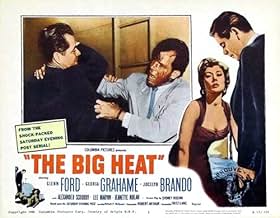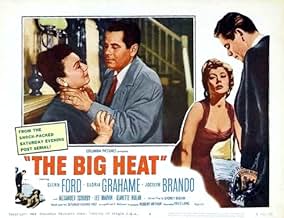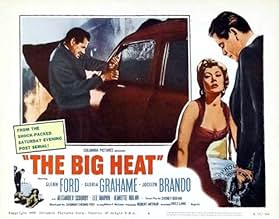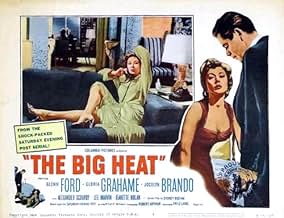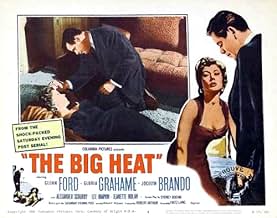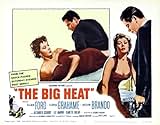IMDb रेटिंग
7.9/10
31 हज़ार
आपकी रेटिंग
अपनी भाषा में प्लॉट जोड़ेंTough cop Dave Bannion takes on a politically powerful crime syndicate.Tough cop Dave Bannion takes on a politically powerful crime syndicate.Tough cop Dave Bannion takes on a politically powerful crime syndicate.
- पुरस्कार
- 2 जीत और कुल 2 नामांकन
फ़ीचर्ड समीक्षाएं
It's doubtful that even Dirty Harry in his most menacing moments could match the smouldering rage that Glenn Ford brings to the screen in this excellent 1953 Fritz Lang flick. From a modern POV there is nothing unfamiliar here, except maybe the dated hardboiled lingo. The maverick cop, the revenge theme, the underworld characters and heroines. It's just that whereas a modern director would make this into a predictable two hour yawn-fest with slow-motion car accidents and ten minute shootouts with shoulder-launched missiles, Lang's movie clocks in at under 90 minutes, and there isn't an ounce of fat on it. It's lean, fast-moving and engrossing. Not a single camera shot is wasted or unnecessary. The script crackles, the cast is uniformly excellent, and Ford and Lee Marvin in particular are unforgettably intense. Ford, just when he's about to go way over the top, reins himself in, adding to the aura of barely suppressed violence in his character.
The movie can also lurch from plot exposition to sudden, economical and unexpected explosions of violence which can still shock today and must have been extremely confronting fifty years ago. And from there it can become suddenly, unexpectedly sensitive and moving.
Nothing is wasted in this movie. Everything is nailed down just right. It's not that they don't make them like this any more; it's more that they've been making them like this ever since, and generally to lesser and lesser effect.
A strong 8 out of 10.
The movie can also lurch from plot exposition to sudden, economical and unexpected explosions of violence which can still shock today and must have been extremely confronting fifty years ago. And from there it can become suddenly, unexpectedly sensitive and moving.
Nothing is wasted in this movie. Everything is nailed down just right. It's not that they don't make them like this any more; it's more that they've been making them like this ever since, and generally to lesser and lesser effect.
A strong 8 out of 10.
A violent story about a detective working in a corrupt department who investigates the apparent suicide of a fellow officer. Worth seeing for Glenn Ford's prototypical performance and Gloria Grahme's show stealing portrayal of a boozing moll with a conscience. With facial disfigurement and cigarette burns it took violence up a notch from the standard gun play of the past, making it grimmer and more realistic, and giving the story more punch. Grahme's tough and tender role stands out and gives the film a tragic element, while certain of its portrayals of greed and corruption (namely the dead officer's wife) stand out for their attention to detail. In the end, it IS the details that give this formulaic story its clout, and we can thank director Fritz Lang for that.
Fritz Lang can conjure up a paranoid thriller with the greatest of ease (actually, it's probably a lot of work, but it looks easy, which is a feat unto itself), and The Big Heat provides some of his classic paranoia to the proceedings of a story of a good, hard cop on the trail of a case that's gone way too corrupt. There are simple visual touches, amid what looks like a standard-shot thriller (when compared to, say, M, which is Godly in its vision of the darkness of humanity's layers peeled back). But it's got the kind of grit to it that most likely inspired Dirty Harry, even if, arguably, Glenn Ford isn't quite as great a star as Clint Eastwood. He's got a style to himself, anyway, like someone who is almost TOO good, and knows it, which is why he'll get the job done even if it means some busted knuckles and a few cracked heads. He's a compelling force as Dave Bannion, and he's perfectly cast against a bunch of sinister, slimy characters (save for the women, and even one of them is just rotten).
After a cop seems to have killed himself, the case looks open and shut. But there seems to be more for Bannion, as he didn't seem like a guy, from some accounts, to do himself in. Turns out there's a big cheese named Lagana who wants this put hush-hush like, and pays off the widow to keep a letter he wrote under wraps. But Bannion is suddenly put to the test, if only of himself, when his family is put in danger (with, of course, tragic results). Lang doesn't stop for a detail that isn't worthy of the attention of the narrative, and there's a connection that he makes between the world of the criminal underworld and the law: it's a place where there's some gray, but the black and white aspect rings through due to the situation at hand: corrupt cops, dirty criminals, and only a couple of dames to trust in the mix of it (one of them Debby, played in another great turn by Gloria Grahame, takes a savage incident with a pot of coffee via Lee Marvin's hand to wise up).
It might not have the depth of an M or Scarlett Street, but the Big Heat is about as solid a genre piece as one could ask for, getting more harrowing from the first gun shot of the picture all the way to the final moment when Bannion leaves the office for a hit-and-run case (a cop's work is never finished, one might suggest). It's also got more intelligence for its conventional roots with the little things; for example, there's a point in the movie where something pivotal could've happened with Bannion's daughter and the thugs, but Lang makes a good step to push aside it, keeping the focus squarely on the task at hand instead of sidestepping the climax into cliché. Land understands how, for the sake of a piece of pulp fiction like this, to keep the lines in order, even if it might seem standard for today: keep Bannion's family wholesome, maybe TOO wholesome, with stories of three little kittens, and keep the criminal elements savage, sinister in their grins and suits and violence brimming underneath.
One things for sure, it doesn't get much less thrilling than seeing Ford and Marvin in an unpredictable shoot-out. A+
After a cop seems to have killed himself, the case looks open and shut. But there seems to be more for Bannion, as he didn't seem like a guy, from some accounts, to do himself in. Turns out there's a big cheese named Lagana who wants this put hush-hush like, and pays off the widow to keep a letter he wrote under wraps. But Bannion is suddenly put to the test, if only of himself, when his family is put in danger (with, of course, tragic results). Lang doesn't stop for a detail that isn't worthy of the attention of the narrative, and there's a connection that he makes between the world of the criminal underworld and the law: it's a place where there's some gray, but the black and white aspect rings through due to the situation at hand: corrupt cops, dirty criminals, and only a couple of dames to trust in the mix of it (one of them Debby, played in another great turn by Gloria Grahame, takes a savage incident with a pot of coffee via Lee Marvin's hand to wise up).
It might not have the depth of an M or Scarlett Street, but the Big Heat is about as solid a genre piece as one could ask for, getting more harrowing from the first gun shot of the picture all the way to the final moment when Bannion leaves the office for a hit-and-run case (a cop's work is never finished, one might suggest). It's also got more intelligence for its conventional roots with the little things; for example, there's a point in the movie where something pivotal could've happened with Bannion's daughter and the thugs, but Lang makes a good step to push aside it, keeping the focus squarely on the task at hand instead of sidestepping the climax into cliché. Land understands how, for the sake of a piece of pulp fiction like this, to keep the lines in order, even if it might seem standard for today: keep Bannion's family wholesome, maybe TOO wholesome, with stories of three little kittens, and keep the criminal elements savage, sinister in their grins and suits and violence brimming underneath.
One things for sure, it doesn't get much less thrilling than seeing Ford and Marvin in an unpredictable shoot-out. A+
This is a classic film noir, beautifully directed by Fritz Lang.. Fast paced non stop plot line & action... Glenn Ford is the good guy with some shades of gray/ Lee Marvin is the bad guy and boy is he bad ; roughs up 2 women/ Carolyn Jones at the bar, slams her hand/ and poor Gloria Grahame/ throws hot boiling coffee in her gorgeous face.. This is a very sadistic scene, and very memorable!!Gloria plays her part to the hilt.. one of her greatest screen moments...She made several film noire movies, In A Lonely Place/ Naked Alibi etc. won her Oscar for a serio comedy role in The Bad & The Beautiful/ sang "I Cant Say No" in Oklahoma.. and was almost crushed by an elephant in The Greatest Show On Earth.. she had a great career... and will always be my favorite 50's bombshell...this film is not to be missed/ Great support by Alex. Scourby, Jeanette Nolan and others.. not to be missed !
Effective film noir about a cop fighting the mob as well as his own corrupt superiors as he investigates a murder. Ford has perhaps the best role of his career as the good cop. His scenes with wife Brando are very nicely handled, adding poignancy to the tragedy that would befall the family. There are shades of Dirty Harry as Ford takes matters into his own hands. Marvin and Grahame are also good as a mobster and his moll, respectively. Lang, a master of this sort of film-making, keeps things moving at a snappy pace. Some of the violence is jarring but of course nothing graphic is shown, given the era the movie was made in. After an excellent start, the second half of the film becomes somewhat routine but it still packs a punch.
क्या आपको पता है
- ट्रिवियाColumbia wanted to borrow Marilyn Monroe from 20th Century-Fox to play the role of Debby Marsh, but Fox's asking price was too high. Gloria Grahame was cast instead.
- गूफ़The street address for the junkyard on Bannion's list is "101", yet the number "1024" is seen on a large sign over the yard's shed.
- भाव
Debby Marsh: [to Bannion] Oh, well, you're about as romantic as a pair of handcuffs.
- कनेक्शनFeatured in Mean Streets (1973)
- साउंडट्रैकIt's a Blue World
(uncredited)
Written by Chet Forrest and Bob Wright
Heard instrumentally during one of the scenes at The Retreat
टॉप पसंद
रेटिंग देने के लिए साइन-इन करें और वैयक्तिकृत सुझावों के लिए वॉचलिस्ट करें
विवरण
- रिलीज़ की तारीख़
- कंट्री ऑफ़ ओरिजिन
- भाषा
- इस रूप में भी जाना जाता है
- Los sobornados
- फ़िल्माने की जगहें
- उत्पादन कंपनी
- IMDbPro पर और कंपनी क्रेडिट देखें
बॉक्स ऑफ़िस
- दुनिया भर में सकल
- $7,083
- चलने की अवधि1 घंटा 29 मिनट
- रंग
- पक्ष अनुपात
- 1.37 : 1
इस पेज में योगदान दें
किसी बदलाव का सुझाव दें या अनुपलब्ध कॉन्टेंट जोड़ें


